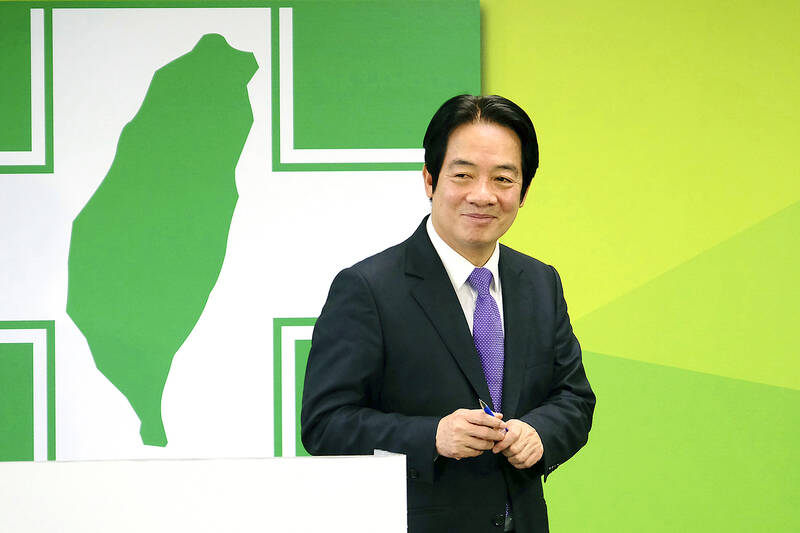Taiwan is already a sovereign and independent nation and therefore has no need to declare its independence, Vice President William Lai (賴清德) said at his swearing in as Democratic Progressive Party (DPP) chairman in Taipei yesterday.
Lai, who is regarded as the frontrunner to secure the DPP’s nomination for next year’s presidential election, made the comment after being asked to clarify his cross-strait policy.
Last month, he said it was to promote peace while protecting Taiwan.

Photo: Johnson Lai, AP
As a leading DPP politician who has previously called himself “a political worker for Taiwanese independence,” Lai’s recent comments are seen as marking a shift in the party’s policy regarding Beijing.
The DPP would continue to stand firm on President Tsai Ing-wen’s (蔡英文) four commitments in managing cross-strait ties under his leadership, he said yesterday.
Tsai’s commitments are to defend the nation’s sovereignty and democratic constitutional order, ensure China and Taiwan are not subordinate to each other, resist annexation or encroachment upon Taiwan’s sovereignty, and guarantee that Taiwan’s future is determined by Taiwanese alone, he said.
Asked to comment on his strategy to settle the differences between Taipei and Beijing, Lai said that China’s constant rhetorical attacks, military threats and efforts to alter the “status quo” are to blame for the rise in tensions, which is a problem Taiwan cannot resolve on its own.
Asked about his strategy to settle the differences between the two sides, Lai said that Taiwan cannot be expected to alleviate regional tensions caused by Beijing.
China should seek common ground with Taiwan and join forces in the fight against the COVID-19 pandemic, disasters and other humanitarian crises, which would benefit ordinary Chinese, he said.
Lai — who took the reins of the DPP from Kaohsiung Mayor Chen Chi-mai (陳其邁), who was acting chairman — announced reforms to restore the party’s electoral competitiveness following its rout in the nine-in-one local elections last year.
The reforms include purging corruption and dealing with members accused of breaching academic ethics, he said.
The DPP would improve the role of the democratic process to promote talent, restore its standing among diverse social forces and better respond to the needs of young people, he said.
The party’s platform to protect and promote democracy, peace and prosperity would be carried out by policies that emphasize the economy, societal issues, national defense and peace, Lai said.
The DPP must continue to create blueprints to develop the nation and share the fruits of economic growth without excluding any societal groups, he said.
The party should address the gap between rich and poor people, facilitate the creation of a tolerant and harmonious society, and ensure that peace and stability prevail in the Indo-Pacific region, he said.
Additional reporting by CNA

CHAOS: Iranians took to the streets playing celebratory music after reports of Khamenei’s death on Saturday, while mourners also gathered in Tehran yesterday Iranian Supreme Leader Ayatollah Ali Khamenei was killed in a major attack on Iran launched by Israel and the US, throwing the future of the Islamic republic into doubt and raising the risk of regional instability. Iranian state television and the state-run IRNA news agency announced the 86-year-old’s death early yesterday. US President Donald Trump said it gave Iranians their “greatest chance” to “take back” their country. The announcements came after a joint US and Israeli aerial bombardment that targeted Iranian military and governmental sites. Trump said the “heavy and pinpoint bombing” would continue through the week or as long

TRUST: The KMT said it respected the US’ timing and considerations, and hoped it would continue to honor its commitments to helping Taiwan bolster its defenses and deterrence US President Donald Trump is delaying a multibillion-dollar arms sale to Taiwan to ensure his visit to Beijing is successful, a New York Times report said. The weapons sales package has stalled in the US Department of State, the report said, citing US officials it did not identify. The White House has told agencies not to push forward ahead of Trump’s meeting with Chinese President Xi Jinping (習近平), it said. The two last month held a phone call to discuss trade and geopolitical flashpoints ahead of the summit. Xi raised the Taiwan issue and urged the US to handle arms sales to

BIG SPENDERS: Foreign investors bought the most Taiwan equities since 2005, signaling confidence that an AI boom would continue to benefit chipmakers Taiwan Semiconductor Manufacturing Co’s (TSMC, 台積電) market capitalization swelled to US$2 trillion for the first time following a 4.25 percent rally in its American depositary receipts (ADR) overnight, putting the world’s biggest contract chipmaker sixth on the list of the world’s biggest companies by market capitalization, just behind Amazon.com Inc. The site CompaniesMarketcap.com ranked TSMC ahead of Saudi Aramco and Meta Platforms Inc. The Taiwanese company’s ADRs on Tuesday surged to US$385.75 on the New York Stock Exchange, as strong demand for artificial intelligence (AI) applications led to chip supply constraints and boost revenue growth to record-breaking levels. Each TSMC ADR represents

State-run CPC Corp, Taiwan (CPC, 台灣中油) yesterday said that it had confirmed on Saturday night with its liquefied natural gas (LNG) and crude oil suppliers that shipments are proceeding as scheduled and that domestic supplies remain unaffected. The CPC yesterday announced the gasoline and diesel prices will rise by NT$0.2 and NT$0.4 per liter, respectively, starting Monday, citing Middle East tensions and blizzards in the eastern United States. CPC also iterated it has been reducing the proportion of crude oil imports from the Middle East and diversifying its supply sources in the past few years in response to geopolitical risks, expanding